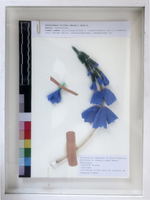Items
Site
The Medicine Chest
keywords is exactly
blindness
-

Foxgloves
Called variously foxgloves, witch’s gloves, dead men’s bells, fairy’s gloves, bloody fingers, gloves of our lady, fairy caps, virgin’s gloves or fairy thimbles, Digitalis purpurea is popular with children, who pluck the tempting bell-shaped blooms and wear them like thimbles, admonished not to lick their fingers afterwards for fear they will go blind (Young 2002: 57). While the flower can be lethal if ingested, the drug digitalis derived from foxglove is most commonly used as a heart stimulant. Digitalis has been prescribed since the 17th century, perhaps earlier, as a diuretic and to slow the pulse and is still the drug of choice for atrial fibrillation. In the 1770s, William Withering got an old family recipe, a herbal infusion for treating swollen legs, from a Shropshire woman and identified digitalis as the active one of the twenty ingredients. Many more antiarrhythmic drugs now exist (Young 2002: 57). Made up of surgical gloves, Band-Aids, syringes and IV-tubing (with an infusion of foxglove leaves in its stem) the work mimicked the language of the herbarium specimen, drawing a viewer in to examine the content they were expecting, only to surprise them with its incongruous materials. -

Face value
"In 1993, the [Lydenberg] heads were temporarily moved from the SAM stairs into the SANG as part of Payne’s exhibition. In the gallery context, where ‘the shifting definitions of art, the meaning of objects, the contexts of spaces as well as the politics of culture are continuously examined’ (Martin in Payne 1993: 4), these objects became part of an exhibition of Payne’s own terracotta heads, painted and sculpted cases, etchings inspired by the heads, drawings and a collection of supermarket trolleys" (Liebenberg 2021: 159 - 160). -

“I am just going outside and may be some time"
After initially making good progress, Terra Nova expedition party’s prospects steadily worsened as they struggled northward. Deteriorating weather, frostbite, snow blindness, hunger and exhaustion led to Edgar Evans dying on 17 February and Lawrence Oates, whose condition was aggravated by an old war-wound to the extent that he was barely able to walk, voluntarily leaving his tent on 16 March and walking to his death. (“I am just going outside and may be some time".)" (Liebenberg 2011: 75).


